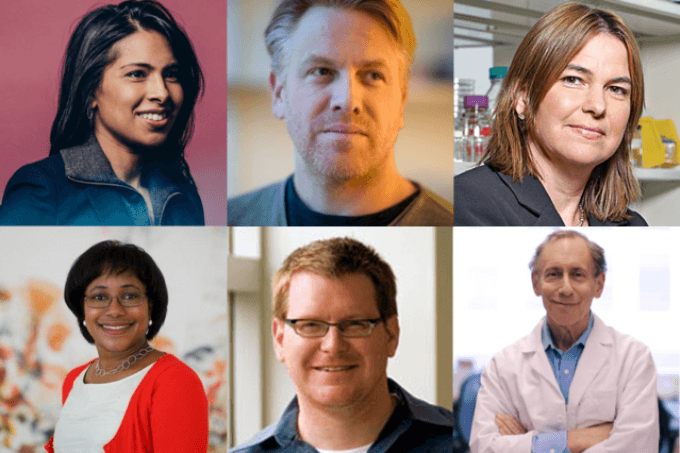Jul 10 2017
The Koch Institute for Integrative Cancer Research at MIT will soon be reaching the first anniversary of the launch of the Marble Center for Cancer Nanomedicine, founded through a generous gift from Kathy and Curt Marble ’63.
 The Marble Center for Cancer Nanomedicine’s faculty is made up of Koch Institute members who are committed to fighting cancer with nanomedicine through research, education, and collaboration. Top row (l-r) Sangeeta Bhatia, director; Daniel Anderson; and Angela Belcher. Bottom row: Paula Hammond; Darrell Irvine; and Robert Langer. (Photo: Koch Institute Marble Center for Cancer Nanomedicine)
The Marble Center for Cancer Nanomedicine’s faculty is made up of Koch Institute members who are committed to fighting cancer with nanomedicine through research, education, and collaboration. Top row (l-r) Sangeeta Bhatia, director; Daniel Anderson; and Angela Belcher. Bottom row: Paula Hammond; Darrell Irvine; and Robert Langer. (Photo: Koch Institute Marble Center for Cancer Nanomedicine)
Bringing together leading Koch Institute faculty members and their teams, the Marble Center for Cancer Nanomedicine focuses on huge challenges in cancer detection, treatment and monitoring that can profit from the latest physics and biology of the nanoscale.
These challenges include spotting cancer earlier than present techniques allow, harnessing the immune system to combat cancer even as it progresses, using therapeutic insights from cancer biology to design therapies for formerly undruggable targets, integrating current drugs for synergistic action, and developing tools for more accurate diagnosis and improved surgical intervention.
Koch Institute member Sangeeta N. Bhatia, the John J. and Dorothy Wilson, Professor of Health Sciences and Technology and Electrical Engineering and Computer Science, serves as the Inaugural Director of the center.
A major goal for research at the Marble Center is to leverage the collaborative culture at the Koch Institute to use nanotechnology to improve cancer diagnosis and care in patients around the world.
Sangeeta N. Bhatia, Koch Institute Member
Transforming nanomedicine
The Marble Center joins MIT’s larger efforts at the forefront of discovery and advancement to solve the critical global challenge that is cancer. The concept of “convergence” — the combination of the life and physical sciences with engineering — is a trademark of MIT, the founding principle of the Koch Institute, and at the heart of the Marble Center’s mission.
The center galvanizes the MIT cancer research community in efforts to use nanomedicine as a translational platform for cancer care. It’s transformative by applying these emerging technologies to push the boundaries of cancer detection, treatment, and monitoring — and translational by promoting their development and application in the clinic.
Tyler Jacks, Director of the Koch Institute and a David H. Koch Professor of Biology
The centers faculty — six renowned MIT Professors and Koch Institute Members — are committed to combating cancer with nanomedicine through research, education and partnership. They are, Sangeeta Bhatia (director), the John J. and Dorothy Wilson Professor of Health Sciences and Technology and Electrical Engineering and Computer Science; Daniel G. Anderson, the Samuel A. Goldblith Professor of Applied Biology in the Department of Chemical Engineering and the Institute for Medical Engineering and Science; Angela M. Belcher, the James Mason Crafts Professor in the departments of Biological Engineering and Materials Science and Engineering; Paula T. Hammond, the David H. Koch Professor of Engineering and head of the Department of Chemical Engineering; Darrell J. Irvine, Professor in the departments of Biological Engineering and Materials Science and Engineering; and Robert S. Langer, the David H. Koch Institute Professor.
Extending their partnership within the walls of the Institute, members of the Marble Center profit greatly from the support of the Peterson (1957) Nanotechnology Materials Core Facility in the Koch Institute’s Robert A. Swanson (1969) Biotechnology Center. The Peterson Facility’s array of technological resources and know-how is unparalleled in the United States, and gives members of the center and of the Koch Institute, a distinctive advantage in the development and application of materials and technologies at the nanoscale.
Looking ahead
The Marble Center made the most of its first year, and has provided backing for advanced research projects including theranostic nanoparticles that can both detect and treat cancers, real-time imaging of interactions between cancer and immune cells to properly understand reaction to cancer immunotherapies, and delivery technologies for a number of powerful RNA-based therapeutics capable of engaging specific cancer targets with precision.
As part of its efforts to help adopt a multifaceted science and engineering research force, the center has offered fellowship support for trainees — as well as valuable opportunities for scientific exchange, mentorship and professional development.
Promoting wider engagement, the Marble Center serves as a bridge to a broad network of nanomedicine resources, linking its members to MIT.nano, other Nanotechnology Researchers, and Clinical Partners across Boston and beyond. The center has also set up a scientific advisory board, whose members come from leading clinical and academic centers around the country, and will assist in shaping the center’s future programs and continued development.
As the Marble Center enters another year of partnerships and innovation, there is a new landmark in sight for 2018. Nanomedicine has been chosen as the main theme for the Koch Institute’s 17th Annual Cancer Research Symposium. The event is scheduled for June 15th, 2018, and will bring together national domain experts, providing a perfect forum for Marble Center members to share the discoveries and progresses made during its sophomore year.
Having next year’s KI Annual Symposium dedicated to nanomedicine will be a wonderful way to further expose the cancer research community to the power of doing science at the nanoscale. The interdisciplinary approach has the power to accelerate new ideas at this exciting interface of nanotechnology and medicine.
Sangeeta N. Bhatia, Koch Institute Member